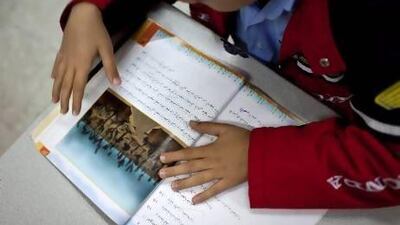DUBAI // Zayed University's new Arabic Language Institute is beginning work with the Ministry of Education to better train the country's Arabic teachers.
Dr Obaid Al Muhairi, head of the new institute, hopes to banish the outdated teaching methods and lack of standardisation that results in most Emirati students starting university with a "very low" standard of Arabic.
"There is a need on the part of the Ministry of Education and the public schools to reform Arabic language [teaching]," he said. "They have to meet certain standards - and the students aren't meeting those levels."
While government schools teach mainly in Arabic, almost all courses at federal university are taught in English, so there is no Arabic language requirement for entry.
Because of that, Arabic is not tested as part of the school-leaving Cepa exams. An attempt about five years ago to include it in the Cepa tests did not get beyond the pilot stage - it was seen as unnecessary, and the exam was too difficult for most students.
Now the institute wants to try again. "We are trying to standardise the high school assessments," said Dr Rahman Said Haleem, director of the institute. "We're trying to find a way like Toefl [test of English as a foreign language] assessment, so when you hear a number [score], you know what it means worldwide."
But that needs to be accompanied by better teaching - which means better trained teachers.
"There are teachers who are looking to do more professional development as well relating to teaching strategies," said Dr Muhairi,
Dr Natasha Ridge, head of research at the Al Qassimi Foundation for Policy Studies, suggested the lack of good Arabic teachers may warrant a more thorough review.
"If existing teachers are not able to teach this to a high enough standard then there needs to be a serious examination of teacher training mechanisms," she said.
"Perhaps the attention given to improving English language teaching needs now to be given to improving Arabic as well."
Universities have struggled to recruit potential Arabic teachers to their training courses. "Maybe they don't see the same job opportunities," said Dr Steven Bossert, dean of education at UAE University.
But training teachers in modern classroom methods - including the use of technology - is crucial, he said. "Teachers who have been teaching for five or 10 years probably learnt to teach in a more didactic way, so it's easier for them to teach in the way they learnt. Breaking these patterns can be a challenge, but it's not impossible."
The key is thorough professional development. "It's not the frequency but the quality of the professional development," he said. "You can give teachers workshops or put new materials in their hands but unless there's on-site follow up where you coach teachers, only a handful of teachers will put it into practice."

